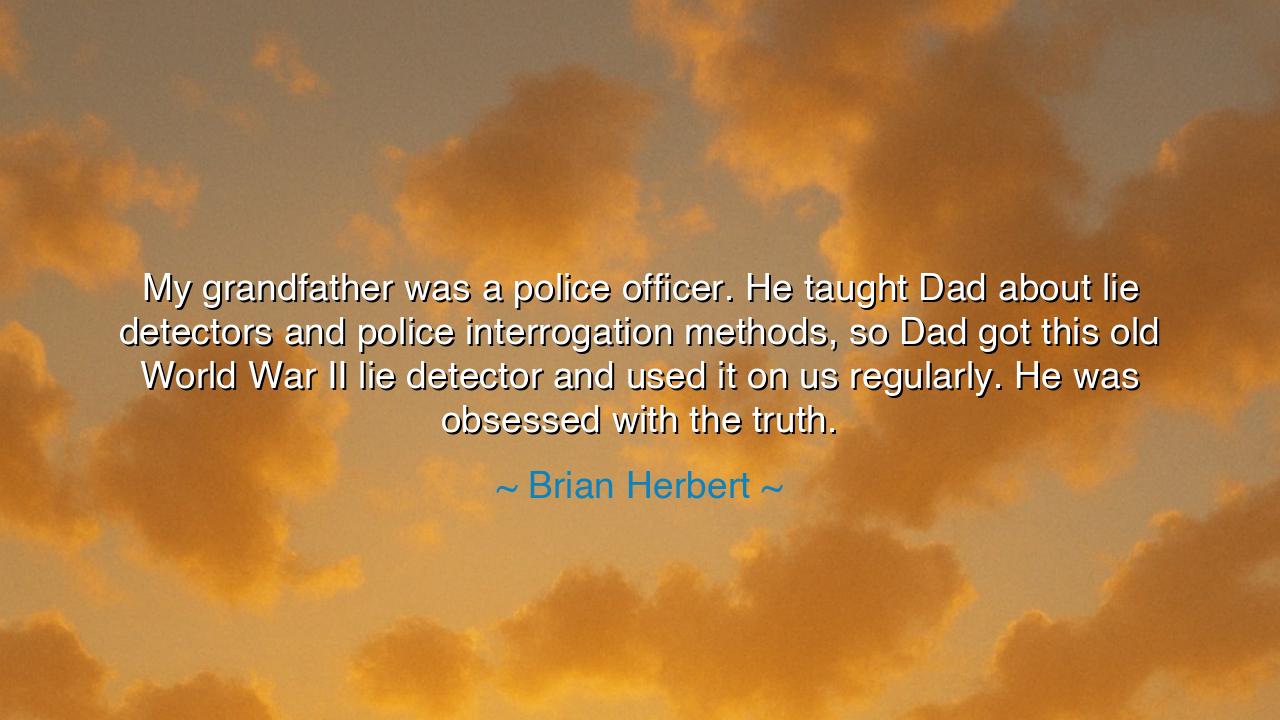
My grandfather was a police officer. He taught Dad about lie
My grandfather was a police officer. He taught Dad about lie detectors and police interrogation methods, so Dad got this old World War II lie detector and used it on us regularly. He was obsessed with the truth.






In the words of Brian Herbert, “My grandfather was a police officer. He taught Dad about lie detectors and police interrogation methods, so Dad got this old World War II lie detector and used it on us regularly. He was obsessed with the truth.” Within these curious words lies a profound reflection on the human hunger for truth, that ancient fire which has both guided and consumed humankind through the ages. This is not merely a family anecdote; it is a parable about the line between wisdom and obsession, between justice and judgment. The lie detector becomes a symbol — a relic of war, now turned inward upon the heart — measuring not the tremors of guilt alone, but the trembling complexity of the human soul.
The origin of this saying rests in the life of Brian Herbert, the son of the legendary author Frank Herbert, creator of Dune. The elder Herbert was a man who pondered the moral, psychological, and spiritual nature of truth. From his own father — a policeman trained in interrogation — he inherited both curiosity and caution toward the mechanisms of honesty. The old World War II lie detector, passed from generation to generation, stands as a strange heirloom: a tool of science used not in courtrooms but in a family home. Through it, the Herberts confronted a timeless question — can truth ever be forced, or must it be revealed by the willing heart?
The obsession with truth is one of humanity’s oldest burdens. From the prophets of old who cried against falsehood, to the philosophers who measured reality with reason, mankind has pursued truth as both lover and tormentor. Yet those who chase it too fiercely may lose sight of compassion. For truth without mercy becomes cruelty, and knowledge without wisdom becomes tyranny. The father in Herbert’s tale, though noble in intent, wielded his lie detector not merely as a device but as a weapon of certainty. It was not enough for him to trust; he sought to know, and in that quest, he mirrored the peril of all who mistake control for clarity.
History, too, offers its mirrors. Consider Diogenes of Sinope, the ancient philosopher who roamed the streets of Athens with a lantern in daylight, declaring, “I am looking for an honest man.” He, too, was obsessed with truth — not through machines, but through confrontation. He exposed hypocrisy, mocked pretense, and sought purity of character. Yet his life, though legendary, was marked by loneliness, for the world rarely welcomes those who demand absolute honesty. So too did Herbert’s father, with his machine of war, reenact Diogenes’ search — probing not the public, but his own kin, in a microcosm of humanity’s endless trial before the tribunal of truth.
And yet, we must not mock such men, for their hunger arises from the noblest root. The love of truth is sacred; it is the foundation of justice, of trust, of civilization itself. Without it, words lose meaning and the soul drifts into shadow. The great challenge is to balance that love with compassion — to seek truth not as a conqueror, but as a gardener tending fragile growth. The lie detector, cold and mechanical, may capture the rhythm of a heartbeat, but not the pulse of conscience. True understanding lies beyond wires and dials; it is found in the quiet discernment of the heart that listens before it judges.
In Herbert’s tale, there is both warning and wonder. The grandfather’s discipline, the father’s intensity, and the son’s reflection form a lineage of inquiry — a reminder that the quest for truth is inherited, evolving, and eternal. The child who once trembled before the lie detector grows into the man who sees beyond it, who realizes that truth is not a machine to be mastered, but a mirror to be faced. Thus the story transforms from one of control to one of awakening, teaching us that truth must be lived, not extracted.
Let this be the lesson: seek the truth, but do not become enslaved to it. Let your honesty be tempered with love, your inquiry softened by understanding. Ask not only “What is true?” but “Why must I know?” For sometimes the deepest truths cannot be spoken or measured — they are lived in the integrity of one’s actions and the gentleness of one’s heart.
And so, when Brian Herbert tells of the father who “was obsessed with the truth,” he is really speaking of the human condition — our eternal yearning to pierce illusion and stand in the light. The challenge for every generation is to hold that light without burning others with it. For the greatest truth, as the ancients taught, is not found in interrogation or detection, but in compassion — the courage to see clearly, and yet still love.






AAdministratorAdministrator
Welcome, honored guests. Please leave a comment, we will respond soon